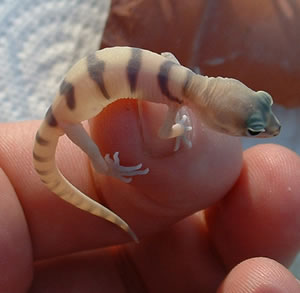
A Comprehensive Guide to Caring for a Baby Gecko
Introduction
Baby geckos, with their delicate features and curious nature, make captivating pets for reptile enthusiasts. However, providing proper care for these tiny creatures requires a thorough understanding of their specific needs. This comprehensive guide will delve into every aspect of baby gecko care, from habitat setup to feeding and health maintenance.
Habitat Setup
Enclosure:
- Choose a terrarium that is appropriately sized for the gecko’s age and species. A 10-gallon tank is suitable for a baby gecko, but as it grows, a larger enclosure will be necessary.
- Ensure the enclosure has ample ventilation to prevent respiratory issues.
Substrate:
- Provide a substrate that mimics the gecko’s natural habitat. Options include coconut fiber, reptile carpet, or paper towels.
- Keep the substrate clean and dry to prevent bacterial growth.
Hiding Places:
- Baby geckos require multiple hiding places to feel secure. Provide a variety of options, such as caves, logs, or artificial plants.
- Ensure the hiding places are dark and enclosed to provide a sense of privacy.
Heating:
- Baby geckos are ectothermic, meaning they rely on external heat sources to regulate their body temperature.
- Create a thermal gradient within the enclosure using a heat lamp or heating pad.
- The warm side of the enclosure should be around 85-90°F (29-32°C), while the cool side should be 75-80°F (24-27°C).
Lighting:
- Baby geckos require a day/night cycle to maintain their circadian rhythm.
- Provide 12-14 hours of UVB lighting during the day to promote calcium absorption and prevent metabolic bone disease.
- Turn off the lights at night to simulate darkness.
Humidity:
- Most baby geckos require moderate humidity levels between 50-70%.
- Mist the enclosure with lukewarm water several times a day to maintain humidity.
- Avoid excessive humidity, as it can lead to respiratory infections.
Feeding
Diet:
- Baby geckos are primarily insectivores.
- Offer a variety of live insects, such as crickets, mealworms, and dubia roaches.
- Dust insects with calcium powder to prevent nutritional deficiencies.
Feeding Frequency:
- Feed baby geckos daily or every other day.
- Offer a small amount of food that the gecko can consume within 15-20 minutes.
- Remove uneaten insects to prevent spoilage.
Water:
- Provide a shallow water dish filled with fresh, clean water.
- Change the water daily to prevent contamination.
Health Maintenance
Shedding:
- Baby geckos shed their skin regularly as they grow.
- Provide a humid environment to facilitate shedding.
- If the gecko has difficulty shedding, gently mist it with lukewarm water.
Tail Loss:
- Baby geckos can lose their tails as a defense mechanism.
- If the tail is lost, it will not grow back.
- Keep the gecko in a clean and stress-free environment to prevent tail loss.
Parasites:
- Baby geckos can be susceptible to parasites, such as mites and worms.
- Regularly inspect the gecko for any signs of parasites.
- If parasites are detected, consult a veterinarian for treatment.
Veterinary Care:
- Establish a relationship with a veterinarian who specializes in reptiles.
- Take the gecko for regular checkups to ensure its health and well-being.
- Seek veterinary attention promptly if the gecko exhibits any signs of illness, such as lethargy, loss of appetite, or respiratory distress.
Handling
- Handle baby geckos gently and with care.
- Support their body and avoid squeezing them.
- Wash your hands before and after handling the gecko to prevent the spread of bacteria.
Socialization:
- Baby geckos are solitary creatures and do not require companionship.
- However, handling them regularly can help them become accustomed to human interaction.
Conclusion
Caring for a baby gecko requires a commitment to providing a suitable habitat, proper nutrition, and attentive health maintenance. By following the guidelines outlined in this comprehensive guide, you can ensure that your baby gecko thrives and brings you years of joy and companionship. Remember, the well-being of your pet is paramount, and seeking professional veterinary advice whenever necessary is crucial for its long-term health and happiness.
